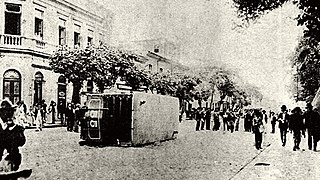Contents
| 1874 in Brazil |
|---|
| Flag |
 20 stars (1871–89) |
| Timeline of Brazilian history |
| Empire of Brazil |
| Year of Constitution: 1824 |
Events in the year 1874 in Brazil .
| 1874 in Brazil |
|---|
| Flag |
 20 stars (1871–89) |
| Timeline of Brazilian history |
| Empire of Brazil |
| Year of Constitution: 1824 |
Events in the year 1874 in Brazil .
Birsa Munda was an Indian tribal independence activist, and folk hero who belonged to the Munda tribe. He spearheaded a tribal religious millenarian movement that arose in the Bengal Presidency in the late 19th century, during the British Raj, thereby making him an important figure in the history of the Indian independence movement. The revolt mainly concentrated in the Munda belt of Khunti, Tamar, Sarwada and Bandgaon.
Muckers is the nickname given to the followers of the teaching of Johann Heinrich Schönherr (1770–1826) and Johann Wilhelm Ebel (1784–1861). The word originates in the Middle German word muckern, which was used also to denote the clearing of stalls and stables. In some areas of Germany, the word was spelled muggeln.

The Carandiru massacre occurred on 2 October 1992, in Carandiru Penitentiary in São Paulo, Brazil, when military police stormed the penitentiary following a prison riot. The massacre, which left 111 prisoners dead, is considered by many people to be a major human rights violation.

The Vaccine Revolt was a popular riot that took place between 10 and 16 November 1904 in the city of Rio de Janeiro, then the capital of Brazil. Its immediate pretext was a law that made vaccination against smallpox compulsory, but it is also associated with deeper causes, such as the urban reforms being carried out by mayor Pereira Passos and the sanitation campaigns led by physician Oswaldo Cruz.

Gizab also spelled as Gezab and Gizu, is a district in the Daykundi Province of Afghanistan. It has a population of about 75,503 and includes Hazara and Pashtun ethnic groups. The main town Gizab is at 1364 m altitude along the Helmand River.

The Constitutionalist Revolution of 1932 is the name given to the uprising of the population of the Brazilian state of São Paulo against the Brazilian Revolution of 1930 when Getúlio Vargas assumed the nation's presidency; Vargas was supported by the people, the military and the political elites of Minas Gerais, Rio Grande do Sul and Paraíba. The movement grew out of local resentment from the fact that Vargas ruled by decree, unbound by a Constitution, in a provisional government. The 1930 Revolution also affected São Paulo by eroding the autonomy that states enjoyed during the term of the 1891 Constitution and preventing the inauguration of the governor of São Paulo, Júlio Prestes, who had been elected president of Brazil in 1930, while simultaneously overthrowing President Washington Luís, who was governor of São Paulo from 1920 to 1924. These events marked the end of the First Brazilian Republic.

The Quebra–Quilos revolt was a three-month-long revolt in opposition to the proposed transition to the metric system in Brazil. The unrest took place from 31 October 1874 to January 1875 as part of wider anti-government protests.

Fábio Villela Barreto Borges was a Brazilian filmmaker, actor, screenwriter, and film producer. He was best known for directing O Quatrilho and Lula, o filho do Brasil, a biography based on President Luiz Inácio Lula da Silva's early life, which had been the most expensive film in the history of Brazilian cinema upon its release. Barreto slipped into a coma in 2009 after being involved in a car accident in Rio de Janeiro and, in August 2014, was reported to be in a minimally conscious state. He died on November 20, 2019, after almost 10 years in a coma.

Jean Charles da Silva e de Menezes was a Brazilian man killed by officers of the London Metropolitan Police Service at Stockwell station on the London Underground, after he was wrongly deemed to be one of the fugitives involved in the previous day's failed bombing attempts. These events took place two weeks after the London bombings of 7 July 2005, in which 52 people were killed.
The Revolt of the Muckers was a conflict between two groups in a German community in Southern Brazil, in 1873 and 1874. It took place in the region of Sapiranga, Rio Grande do Sul, Brazil. Jacobina Mentz Maurer, believed by some to be a prophet, led a conflict that was eventually quelled by the Brazilian military, and its leaders either killed or arrested and imprisoned.

Jacobina Mentz Maurer was a Brazilian religious leader. She led the Revolt of the Muckers that happened in a German community in Brazil.

Jacobina is a city in the Centro Norte Baiano mesoregion of Bahia. It was founded July 28, 1722 and the population is 82,590. The town is surrounded by mountains, hills, lakes, rivers, springs, and waterfalls. Located in the northwest region of Bahia, in the extreme north of the Chapada Diamantina, Jacobina is 330 kilometers from Salvador and is also known as 'City of Gold', a legacy of the gold mines which attracted the pioneers from São Paulo in the early seventeenth century.

Sapiranga is a city in Brazil in the state of Rio Grande do Sul with a population of roughly 80,000 inhabitants. It is located in an industrial area called "Vale dos Sinos", by the Rio dos Sinos. The town's economy relies heavily on the shoe industry. Other industries are present, but mostly linked to the shoe manufacturing process, such as metallurgic plants in which machinery is built to later be employed in the production of shoes.

Leticia Pena Spiller is a Brazilian actress, producer, director, poet, dancer, writer, and singer-songwriter.

The Revolt of the Lash was a naval mutiny in Rio de Janeiro, Brazil, in late November 1910. It was the direct result of the use of whips ("lashes") by white naval officers when punishing Afro-Brazilian and mixed-race enlisted sailors.

SS-UnterscharführerWilli Bruno Mentz was a member of the German SS in World War II and a Holocaust perpetrator who worked at Treblinka extermination camp during the Operation Reinhard phase of the Holocaust in Poland. Mentz was known as "Frankenstein" at the camp.

Brian van Mentz, was a South-African born flying ace of the Royal Air Force (RAF) during the Second World War. He is credited with destroying at least seven German aircraft.

Matheus Bonifácio Saldanha Marinho, commonly known as Matheus Saldanha, is a Brazilian professional footballer who plays as a forward for Serbian club Partizan.
The rasga-listas were resistance movements to the 1874 lottery law for compulsory military service in the Empire of Brazil. In 1875, when enlistment for the lottery was due to begin, the rebels managed to turn the law into a "dead charter", postponing the lottery indefinitely. The law abolished the forced recruitment practiced by the Armed Forces until then. The old model, known as "blood tribute", was violently conducted by a State with limited administrative and extractive capacity over the population, being a cause of popular rejection of military service. A balance between the State, local authorities and free workers protected workers inserted in patronage networks from recruitment, restricting military service to the "rabble" of society. The system captured few recruits and proved ineffective during the Paraguayan War (1864–1870). The lottery was a European-inspired modernizing reform intended to make recruitment more rational and egalitarian. A large part of the population did not consider equality in the lottery to be fair and did not trust its directors. The lottery did not change the exempt position of the rich, but it tightened the state's demands on the poor population, removing patronage protection. Its beneficiaries, both landowners and workers, did not accept the threat to their way of living with the old recruitment system.